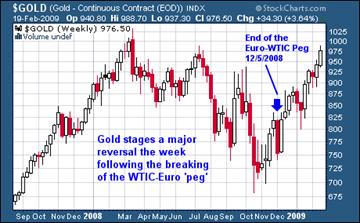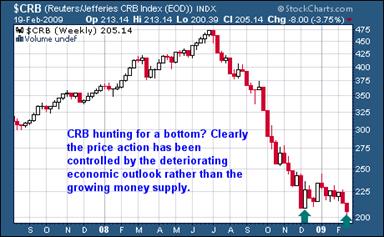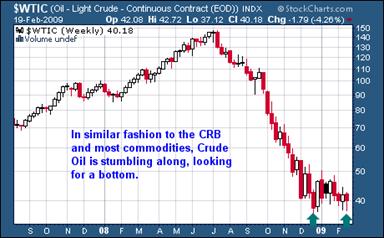U.S. CPI Reverts from Deflation Back to Inflation Mode
Economics / Inflation Feb 20, 2009 - 01:21 PM GMTBy: Andy_Sutton

 For the better part of the second half of 2008, the decision was an easy one. For the first 30 or so days of 2009, the decision remained easy. Then something changed. Something subtle, but at the same time worthy of our utmost attention. Producer and consumer prices began to climb off the mat and beginning in January 2009, there has been a rather remarkable turnaround. Granted, one month does not a trend make, but in this environment, big moves, which have become commonplace bear even more study when they reverse themselves on a dime.
For the better part of the second half of 2008, the decision was an easy one. For the first 30 or so days of 2009, the decision remained easy. Then something changed. Something subtle, but at the same time worthy of our utmost attention. Producer and consumer prices began to climb off the mat and beginning in January 2009, there has been a rather remarkable turnaround. Granted, one month does not a trend make, but in this environment, big moves, which have become commonplace bear even more study when they reverse themselves on a dime.
Ironically, this is the second such major trend shift that we have witnessed in the past 75 days. On 12/5/08, a two-year relationship between WTIC and the Euro ended abruptly. From 12/1/2006 through 12/5/2008, WTIC and the Euro had walked in lock step to a level of statistical significance rarely witnessed. What we had in effect was a pegging of the Euro and Crude oil. A peg that ended on 12/5/2008.
This morning the CPI for January 2009 was released and showed a marked and striking divergence from the trend of the past 6 months. The headline and core numbers both reverted from their ‘deflation-mode' back to their ‘inflation-mode' of late 2007 and early 2008. We have spoken about such a possible inflection point for quite a long time, making the following observation on 11/21/2008:
“However it must be noted that perhaps the biggest ‘fundamental' arguing for increases in equity markets is the trillions of Dollars in new money and credit that has been pumped into financial institutions over the past few months. For whatever reason, that money has largely stayed on the sidelines for the meantime. It is our firm belief, however, that this will change, and when it does we'll have ourselves another epic paradigm shift, and cash will once again become trash. Identifying the inflection point will be the key. Stay tuned.”
We spoke of this situation again on 12/12/2008:
“Now, consider the monetary environment within which we are operating at the present time. Much like the yields on short-term Treasury bills there is zero discipline. None. Money is being created on a massive and unprecedented scale. This is precisely why the banks are sitting on it. If this money were released en masse into the real economy, we would have hyperinflation at the precise time when economic activity is grinding to a halt.”
Unfortunately, as the December disconnect between oil and the Euro and the concomitant reversal in consumer price trends (yes, we believe there is linkage there) indicates, we may have in fact witnessed the inflection point when we see the value of cash again come under attack. If in fact this is the case, Gold will have once again been something of a front-runner despite what have been extraordinary efforts to quench gold's march upward over the years.
And speaking of gold, this writer took a lot of flak back at the end of August 2008 for calling Gold the ‘Opportunity of a Lifetime'. Especially when the price dipped under $700/oz for a brief time in November. Gold bears of every stripe took their shots. Granted, the game is far from over, but let's just take a look at Gold versus the DJIA for a minute. Gold is up over 16% since that article was written, the paper DJIA down nearly 36%. If this doesn't outline the reasons for holding at least a portion of one's assets in real money, then nothing will.
Clearly these are dangerous times for investment portfolios and the underlying wealth they represent. During a massive liquidation phase, it was an easy call to sit on the sidelines, collecting nominal interest from bonds, CD's, and money market funds because we were secure in the knowledge that the money was becoming worth more. Come again? Think in terms of a gallon of gas for example. A good price for a gallon of regular was around $4 last summer. A good average price now is around $2/gallon. So if you had a $20 bill in your pocket last summer, it would have purchased 5 gallons of gas. Now that same $20 bill buys 10 gallons. Obviously the same situation has occurred in terms of stocks and real estate. The money is worth more now than it was last summer. The value of the money wasn't under attack.
Since the creation of the Federal Reserve System in 1913, this phenomenon has been the rare exception rather than the rule, and as such, consumers are less able to quickly recognize and understand the implications.
However, at the same time, in other areas, this has not been the case. Food prices have continued to be persistently high although their rate of increase has slowed somewhat. We have been writing and talking for over two years now about sector-based inflation and how consumers are going to really have to keep their eye on the ball in terms of what is going up and what is going down. The current consumer price environment is indicative of this situation. Ideally, money allocated for food, medical needs, education, and lately, gasoline should be spent today because it will be worth less tomorrow. In the opposite, money allocated for investment in stocks and real estate should be saved because it will be worth more tomorrow. What a world we live in.
If we have indeed witnessed the inflection point where the trillions of dollars parked in investment and commercial banks are finally being let out to play, then our wealth and purchasing power are about to come under serious attack. Obviously the risk in putting such an assertion to paper is that if we return to the previous trend of falling prices even for a brief time, the entire construct will be discredited rather than the possibility that the timing was a bit off being acknowledged.
There are some factors that would help us to confirm or deny that such an inflection point has taken place.
Gold - Gold is in confirmation mode at the present time. It has roared back from the high 600's in November to the precipice of $1000 - a whopping 43% increase, much of it in the time since the Euro-WTIC peg ended on 12/5/2008. We have discussed in our Centsible Investor newsletter for some months now the triumvirate of gold, oil, and the Euro and been following the developing relationships closely. This has enabled us to make the call on inflation quickly as opposed to being 3 or 6 months in arrears. The obvious risk is that we could be early in making this call.

2) CRB Commodities Index – Unlike Gold, the CRB (of which Gold is a component) has not confirmed that such a trend change has taken place. However, as is clearly demonstrated in the chart below, the CRB Index is searching for a bottom and in fact several of the long term indicators we compile internally are close to giving longer term ‘buy' signals.

3) Crude Oil – WTIC, which is also a component of the CRB Index, has languished below $40 for most of the new year. Given the precarious nature of global supplies (yes we still have a production deficit globally), oil is one area where banks might choose to deploy their newly found bailout wealth. The fact that the Euro/WTIC ‘peg' recently ended elevates the probability of this eventuality an order of magnitude of at least several times what it was while the ‘peg' was still in place.

While it is my opinion that we have seen the inflection point, it is still an unconfirmed opinion at this point. The three factors pointed out above along with many other metrics we monitor on a daily basis will aid in either confirming or denying that such an inflection has in fact occurred, and more importantly what to do about it from a capital management perspective.
Clearly it was easy to sit on the sidelines of the equity markets for the second half of last year with little worry of wealth coming under attack by inflation. If in fact we have seen this paradigm shift, however, then it is going to be a very dangerous time ahead. Returns in excess of taxes and inflation will again come to the forefront and the obvious question is where to go? Equity markets are at the very least unstable and that is being rather kind. The good news in this regard is that we have been able to find and report many solutions to our clients and subscribers. Solutions that have passed the tests of 2008 with flying colors while also providing for the inflationary times that I feel lie directly ahead of us. Clearly this is not a time to throw in the towel, but to dig in our heels and prepare to fight another battle for our purchasing power.
Don't miss out on your free copy of our report “ The 7 Mistakes Investors make..and how to avoid them ”. Get your copy today by going to our website www.suttonfinance.net and clicking on the banner.
By Andy Sutton
http://www.my2centsonline.com
Andy Sutton holds a MBA with Honors in Economics from Moravian College and is a member of Omicron Delta Epsilon International Honor Society in Economics. His firm, Sutton & Associates, LLC currently provides financial planning services to a growing book of clients using a conservative approach aimed at accumulating high quality, income producing assets while providing protection against a falling dollar. For more information visit www.suttonfinance.net
Andy Sutton Archive |
© 2005-2022 http://www.MarketOracle.co.uk - The Market Oracle is a FREE Daily Financial Markets Analysis & Forecasting online publication.


